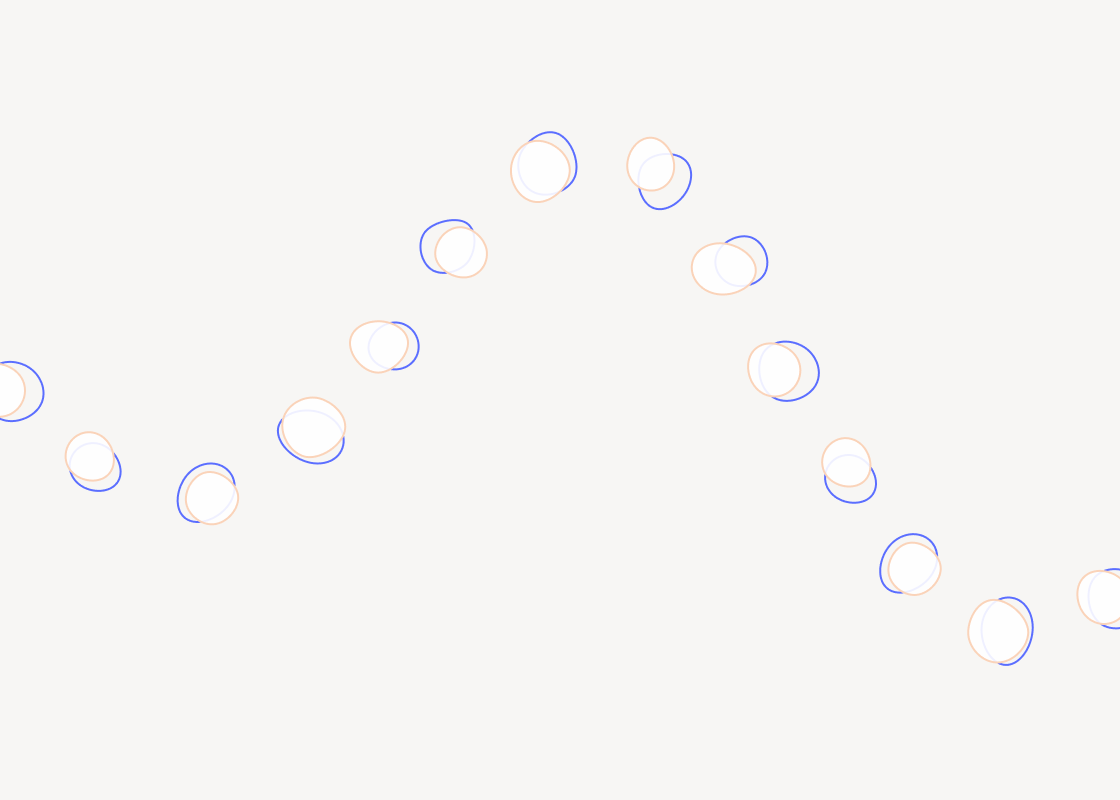That's nothing quite like alcohol to kick off a Netflix evening or a night out with the girls.
While alcohol is a great de-stressor and social lubricant, you may have also heard (or experienced first-hand) the impacts of alcohol on the mind and body.
The question is, "Does alcohol affect your menstrual cycle? And if so, how does it impact your cycle?"
In this article, we'll explore the possible effects of alcohol on your menstrual cycle, hormone levels, and fertility.
Does Having Alcohol Affect Your Cycle?
Currently, research findings on the impact of excessive drinking are conflicting.
Some studies have shown that high alcohol consumption can lead to heavier periods and irregular cycles. Alcohol intake may increase the levels of three different hormones, testosterone, estrogen, and luteinizing hormone. And this hormonal imbalance could be associated with cycle irregularities [1].
On the other hand, other studies have found that heavy drinking did not disrupt the menstrual cycle or cause irregular menses. And interestingly, participants who did not consume alcohol at all seemed to experience more irregular and shorter cycles (<24 days) than those who drank in small amounts [2].
Ultimately, the findings are mixed. And it's not surprising, since alcohol affects each person differently.
A cycle-tracking device like the inne minilab can help you better monitor your cycle, so you'll be able to detect any changes due to lifestyle factors like alcohol consumption.
Can I Drink Alcohol On My Period?
Amidst the cramps and discomfort, having a little alcohol to uplift your mood isn't unsafe.
However, some research has discovered that drinking alcohol can increase your risk of experiencing premenstrual syndrome (PMS)—which typically involves symptoms such as tender breasts, mood swings, tiredness, and irritability. The more you drink, the higher the risk [3].
Nonetheless, this has yet to be confirmed due to conflicting findings from other research [4].
The effects of alcohol on period cramps are also another controversial topic up for debate. Currently, there is no concrete evidence that drinking during your period can intensify period cramps [5].
So, you may very well enjoy a boozy beverage without experiencing PMS symptoms or aggravating your period cramps. The key is to drink in moderation—because the last thing you'd want during Aunt Flo's visit is a nasty hangover.
According to the CDC, moderate drinking is defined as one standard drink or less per day for women (yes, just one!). And heavy drinking refers to having 8 or more drinks per week for women.
Does My Cycle Change How Much I Drink?
Again, this remains inconclusive. Some studies have shown that women tend to crave and drink more alcohol premenstrually (the time in your cycle before you get your menses). Women may be more vulnerable to stress around this time, so drinking may help them cope better with that [6].
Of course, other studies have found no evidence that your alcohol cravings or consumption changes depending on the cycle stage [6]. So, that's another excuse out the window!
How Does Alcohol Affect My Hormones?
Here's how alcohol may affect your hormone levels:
- Increases estrogen levels: This may lead to irregular menstrual cycles or anovulation (no release of an egg during your menstrual cycle) [7].
- Increases prolactin levels: A rise in prolactin can lead to hyperprolactinemia in heavy drinkers. And infertility is a symptom of hyperprolactinemia [7].
- Decreases progesterone levels: This decrease in progesterone may compromise the survival of a fertilised egg—though this is just a theory [8].
Even if these changes occur, they don't necessarily spell trouble for your body.
Your reproductive system functions on an intricate interplay of numerous hormones released by your brain and reproductive organs. Hence, a simple change in levels of a specific hormone will not always impact your body or cycle [8].
While some studies have noticed significant changes in hormone levels due to alcohol consumption, other research showed no apparent differences in hormone values resulting from alcohol intake [9].
Hence, there's no guarantee that your hormone levels will change a certain way due to alcohol consumption. And that's simply because every body is unique.
With that, you may see why alcohol leaves you nursing a monster of a hangover the morning after—while your drinking partner gets away with just darker undereyes.
How Does Alcohol Affect My Fertility?
Alcohol can negatively impact your fertility. Long-term alcohol intake may change the regularity of your cycle. Meanwhile, heavy drinking can diminish the reserve of egg cells in your ovaries, making it harder for you to get pregnant [10].
There are inconsistencies about the effect of moderate drinking on fertility in women.
Nonetheless, some studies have shown that alcohol consumption, even in moderate amounts, may lead to the following outcomes [7, 10]:-
- Irregular menstrual cycles
- Anovulatory cycles and diminished ovarian reserve
- Heightened risk of spontaneous abortion (pregnancy loss before 20 weeks of gestational age)
- Earlier menopause
- Higher risk of failure from assisted reproductive technology (ART)
- Higher risk of miscarriage from ART
Hence, drinking alcohol may negatively affect your chances of conceiving.
If you are pregnant, attempting to get pregnant, or are at risk of unintended pregnancy, it is best to avoid consuming any alcohol at all. There is no "safe level" of drinking if you fall into any of these categories, as alcohol can affect your baby even as soon as the fertilised egg is implanted [10].
Understandably, it may be challenging to give up something you enjoy. But if you're looking to get pregnant and have a healthy baby, it's best to shelve alcohol for the time being.
Final Takeaway: Is Alcohol A Friend Or Foe?
Well, it's hard to have a black-and-white answer to this question, simply because alcohol can affect your body, cycle, and hormones in different ways.
After a day of dealing with pesky coworkers and impending deadlines, it's generally fine to enjoy a glass of wine to decompress (unless your doctor has advised you not to). In most cases, moderate and mindful drinking is unlikely to disrupt your menstrual cycle.
But if you're looking to get pregnant, it's best to give up alcohol for the time being. This ensures your baby's safety and gives you a higher chance of conceiving successfully.
If you're curious about how alcohol (or other lifestyle changes) affect your cycle and hormone levels, the inne minilab can help!
You'll gain deeper insight into your unique cycle and hormone fluctuations across the months. And the Minilab will also help you predict your fertile period, ovulation, and menses each month. There's no easier way to track your cycle!
References
1. Zeru, A. B., Gebeyaw, E. D., & Ayele, E. T. (2021). Magnitude and associated factors of menstrual irregularity among undergraduate students of Debre Berhan University, Ethiopia. Reproductive health, 18(1), 101. https://doi.org/10.1186/s12978-021-01156-1
2. Lyngsø, J., Toft, G., Høyer, B. B., Guldbrandsen, K., Olsen, J., & Ramlau-Hansen, C. H. (2014). Moderate alcohol intake and menstrual cycle characteristics. Human reproduction (Oxford, England), 29(2), 351–358. https://doi.org/10.1093/humrep/det417
3. Fernández, M., Saulyte, J., Inskip, H. M., & Takkouche, B. (2018). Premenstrual syndrome and alcohol consumption: a systematic review and meta-analysis. BMJ open, 8(3), e019490. https://doi.org/10.1136/bmjopen-2017-019490
4. Bertone-Johnson, E. R., Hankinson, S. E., Johnson, S. R., & Manson, J. E. (2009). Timing of alcohol use and the incidence of premenstrual syndrome and probable premenstrual dysphoric disorder. Journal of women's health (2002), 18(12), 1945–1953. https://doi.org/10.1089/jwh.2009.1468
5. Al-Husban, N., Odeh, O., Dabit, T., & Masadeh, A. (2022). The Influence of Lifestyle Variables on Primary Dysmenorrhea: A Cross-Sectional Study. International journal of women's health, 14, 545–553. https://doi.org/10.2147/IJWH.S338651
6. Carroll, H. A., Lustyk, M. K., & Larimer, M. E. (2015). The relationship between alcohol consumption and menstrual cycle: a review of the literature. Archives of women's mental health, 18(6), 773–781. https://doi.org/10.1007/s00737-015-0568-2
7. Rachdaoui, N., & Sarkar, D. K. (2013). Effects of alcohol on the endocrine system. Endocrinology and metabolism clinics of North America, 42(3), 593–615. https://doi.org/10.1016/j.ecl.2013.05.008
8. Gill J. (2000). The effects of moderate alcohol consumption on female hormone levels and reproductive function. Alcohol and alcoholism (Oxford, Oxfordshire), 35(5), 417–423. https://doi.org/10.1093/alcalc/35.5.417
9. Reichman, M. E., Judd, J. T., Longcope, C., Schatzkin, A., Clevidence, B. A., Nair, P. P., Campbell, W. S., & Taylor, P. R. (1993). Effects of alcohol consumption on plasma and urinary hormone concentrations in premenopausal women. Journal of the National Cancer Institute, 85(9), 722–727. https://doi.org/10.1093/jnci/85.9.722
10. Van Heertum, K., & Rossi, B. (2017). Alcohol and fertility: how much is too much?. Fertility research and practice, 3, 10. https://doi.org/10.1186/s40738-017-0037-x



